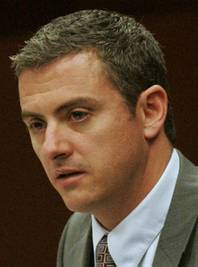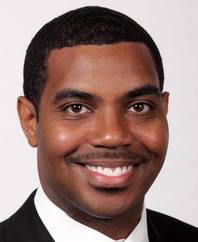Sunday, Aug. 15, 2010 | 2 a.m.

Andrew Clinger

Steven Horsford

Bill Raggio
Sun archives
- State education officials fear deep cuts for public schools (8-14-2010)
- $2.5 billion state budget deficit: ‘Best-case scenario’ (4-23-2010)
- Gibbons signs budget bill; state draws M Resort lawsuit (3-12-2010)
- Budget crunchtime: Lawmakers set to tackle historic deficit (2-23-2010)
- State budget comes up $800 million short (1-22-2010)
Legislative solutions are like water, often following the path of least resistance.
Cutting services that affect constituents or the poor is difficult. So is raising taxes on struggling businesses or voters.
By comparison, taking money from some faceless bureaucracy is easy.
That’s why local governments will once again head into the legislative session with their hands on their wallets and their heads on a swivel.
What good that will do, however, is unclear.
Legislators, policymakers and business groups of all ideological stripes have signaled that local governments will be a target in 2011, when the state is projected to face a budget deficit of about $3 billion.
The latest to suggest such a thing is Andrew Clinger, Gov. Jim Gibbons’ budget director.
This month, Clinger told KRNV Channel 4 in Reno that the state would have to use a combination of cuts and tax increases to close the budget deficit.
A few days later, he modified that statement.
“I don’t believe we can cut 40 to 50 percent of state government,” he said. “The solution, without new revenue, is going to have to include local government in the mix.”
In English, that means dumping state services onto local governments or taking money from them.
Clinger’s comments reflected sentiments of others.
• Senate Majority Leader Steven Horsford, D-Las Vegas, talked about passing responsibility for providing some services to local government, arguing they have not experienced the same level of fiscal pain as the state.
• Senate Minority Leader Bill Raggio, R-Reno, has long thought the balance between what local governments take in taxes compared with the state is tilted, relative to the services they provide.
• Gubernatorial front-runner and Republican Brian Sandoval said he favors giving local governments the authority to raise taxes. “That said, with the transfer of taxation authority comes a duty/burden to deliver services,” he wrote in response to a question from the Sun. He seems to favor some shift of responsibilities — and with it tough decisions about cuts versus taxes — to local governments.
Fueled by studies that say Nevada’s local governments have some of the best-paid workers compared with other local governments, the state and private sector, there is a long-held perception among the Carson City crowd that there are deposits of government fat to be found in the state’s municipalities.
Steve Hill, who is active in state policy for the Las Vegas Chamber of Commerce, said governments in Nevada spend a combined $40 billion every two years. The state’s general fund — which pays for things such as Medicaid, prisons, a large portion of K-12 costs and higher education — represents about $6.8 billion.
“There are lots of people concerned about what we’re going to do with the deficit,” he said. “This is a particularly bad time to have to raise taxes. But we also have a $3 billion deficit. If we just look at it from a general fund perspective, it’s a fairly overwhelming problem.”
He called for “prioritizing expenditures across all levels of government.”
State officials turning to local governments has become a biennial tradition in Nevada.
In the 1980s, the state shifted sales and property taxes between state and local government in a way local government officials thought favored the state. It was called the “tax shift,” but bitter local governments still call it the “tax shaft.”
Clark County Manager Virginia Valentine said that during the past two legislative sessions, the state has taken money from the county.
She noted that housing assistance the county provides to the poor has been slashed, from a three-month benefit for most to a single month’s assistance with rent.
“Our general fund budget is down,” she said. “We’re trying to live within our means.”
Valentine said she hopes lawmakers won’t turn to local governments, but if they do, they should look elsewhere. Counties bore the brunt of the assault last session, she noted.
“I would hate to see counties singled out because counties provide regional services — social services, child welfare services — as well as municipal services,” she said. “We have a little bit of a larger mission that I don’t think cities have. I don’t mean to be unsympathetic to their plight, but my concern is that whatever they do, the burden is shared equitably among the local governments.”
Implied in this, of course, is the perceived inevitability of the Legislature’s anticipated local-government money grab.

Join the Discussion:
Check this out for a full explanation of our conversion to the LiveFyre commenting system and instructions on how to sign up for an account.
Full comments policy